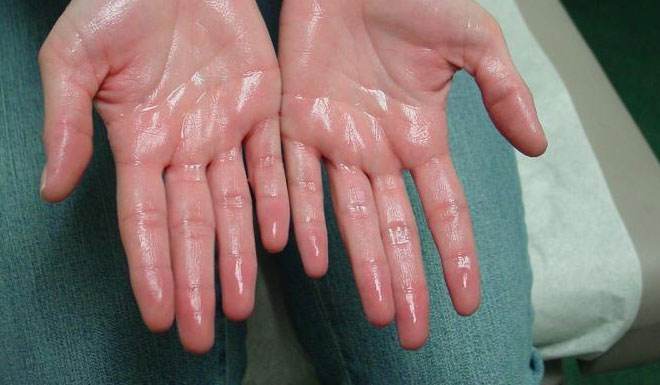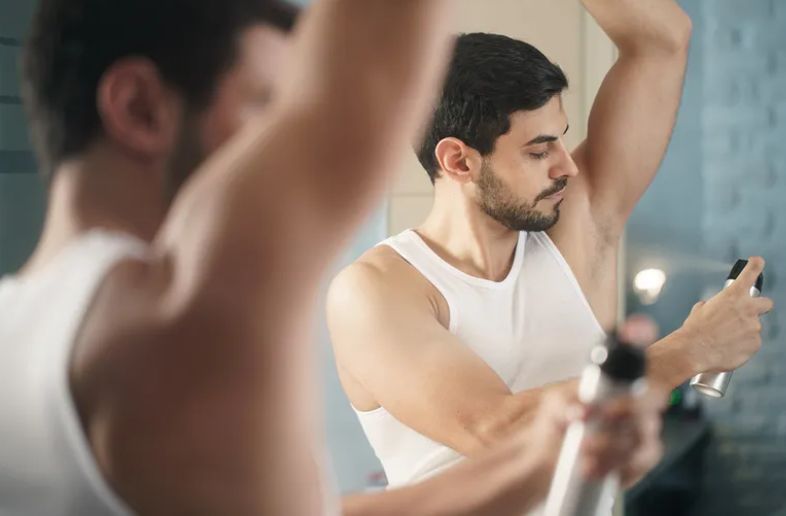Sweating, a normal mechanism of balancing the temperature, can be super annoying in summer because of the itching and bad body odor associated with it.
To add to the pain, some people even sweat in the winter. Not to mention the appearance of sweat on the shirt that makes people stare and you conscious.
So, are you one of those whose armpits cannot stop sweating no matter how often you shower and do everything to keep it under control?
If yes, let’s find out why my armpits smell so much and what I can do to reduce this sweating.
Table of Contents:
- Part 1: Understanding the Physiology of Sweating
- Part 2: Primary Hyperhidrosis
- Part 3: Secondary Hyperhidrosis
- Part 4: Emotional Triggers
- Part 5: Lifestyle Factors
- Part 6: Clothing Choice and Fabrics
- Part 7: Remedies and Management Techniques
Part 1: Understanding the Physiology of Sweating
 Knowing how exactly the gland functions is essential for understanding any pathology or abnormal physiology of any organ or gland.
Knowing how exactly the gland functions is essential for understanding any pathology or abnormal physiology of any organ or gland.
When it comes to sweating in the armpits, sweat glands are responsible. So, here is the basic knowledge about the physiology of sweating.
Role of Sweat Glands in the Body
The human body consists of over 5 million sweat glands, mainly of two types: apocrine glands and eccrine glands. The apocrine glands are located everywhere hair is and produce thick sweat.
On the other hand, the eccrine glands are present on the whole surface of the skin and they produce watery sweat. The role of these sweat glands in the body is to regulate temperature.
This happens through evaporative cooling. It means that sweat glands are stimulated whenever the temperature of the surroundings rises. And the sweat that is produced evaporates to give a cooling sensation.
Normal Thermoregulatory Sweating
The hypothalamus is a control center for temperature regulation. It senses an increase in temperature and sends signals to sweat glands through postganglionic sympathetic innervation.
In response, sweat glands produce sweat that reduces the body’s temperature by evaporation.
Abnormal Excessive Sweating
Normal sweating is a response to hot temperatures, emotional status, stress, spicy food intake, and even hormonal imbalance. However, abnormal excessive sweating is sweating in the absence of these triggers or sweating more than usual even when such stimuli are present.
It occurs when the weather is pleasant or cold, you are in a happy mood, there is no menses or menopause, and you are resting.
Sweating, as a multifactorial Trait
Although the major role of sweat production in the body is to balance the body heat with the environmental temperature, it is affected by several other factors as well.
Similarly, abnormal excessive sweating, also called hyperhidrosis, can have several aetiologies. It is mainly divided into primary hyperhidrosis and secondary hyperhidrosis.
The difference between the two, along with other factors that trigger normal sweating and excessive sweating, is given below.
Part 2: Primary Hyperhidrosis
 Primary hyperhidrosis is when the body sweats excessively without any trigger or known cause. It is an idiopathic entity that is believed to result from a genetic mutation as it runs in families.
Primary hyperhidrosis is when the body sweats excessively without any trigger or known cause. It is an idiopathic entity that is believed to result from a genetic mutation as it runs in families.
Also known as primary focal hyperhidrosis, you are more likely to sweat on the hands, feet, armpits, and face if you have this condition. The patients usually present before their mid-twenties. So, if you wonder why my armpits sweat so much even with deodorant, this is the cause.
Furthermore, it is a chronic disease that is difficult to manage with home remedies and general measures. Therefore, medical or surgical intervention is needed in this condition.
Part 3: Secondary Hyperhidrosis
 Secondary hyperhidrosis means excess sweating secondary to a known condition. It can occur in specific areas of the body just like primary hyperhidrosis and can be generalized as well.
Secondary hyperhidrosis means excess sweating secondary to a known condition. It can occur in specific areas of the body just like primary hyperhidrosis and can be generalized as well.
This is the answer to those wondering why my armpits sweat so much even when I’m not hot. So, the conditions that can result in secondary hyperhidrosis are given as,
- Endocrine Disorders: Diseases that affect certain metabolic hormones in the body lead to hyperhidrosis. These include acromegaly, hyperthyroidism, carcinoid syndrome, and adrenal hyperplasia.
- Hormonal Changes: Hormonal changes during pregnancy and menopause can also cause excessive sweating in the body.
- Systemic Diseases: Lifestyle disorders like hypertension and diabetes, psychotic disorders like anxiety, terminal illnesses like cancer, cardiovascular diseases like heart failure, and neuroendocrine disorders like Parkinson’s disease also lead to hyperhidrosis.
- Medications: Excessive sweating is a side effect of some medicines, including levothyroxine, naproxen, albuterol, omeprazole, and more.
As the cause of secondary hyperhidrosis is well-known, treating the cause will treat it as well.
Part 4: Emotional Triggers
Emotional triggers such as anxiety, stress, fear, pain, and nervousness activate the fight-and-flight system of the body. It is the same sympathetic system that innervates the sweat glands.
Because of common innervation, sweat glands are also triggered which results in the production of excessive sweat. This is especially true for apocrine glands that are present in the armpits making you sweat excessively.
In these cases, you must learn to control your emotional activity to control excessive sweating. Therefore, meditation exercises, yoga, and even psychological therapy are appreciated.
Part 5: Lifestyle Factors
 Lifestyle factors play an important role in determining how much you will sweat. From body weight and exercise to diet and hydration, the lifestyle factors below affect hyperhidrosis.
Lifestyle factors play an important role in determining how much you will sweat. From body weight and exercise to diet and hydration, the lifestyle factors below affect hyperhidrosis.
- Diet: Food that activates the digestive system intensely can also activate the sweat center. These include spicy foods, hot sauces, chili powders, and more.
- Hydration: Dehydration can cause compensatory sweating in the body.
- Alcohol and caffeine: Alcohol and caffeine both increase metabolism and cause dehydration, which contributes to excess sweating.
- Environment: If you live in a hot country or the weather of your state is hot, your body will sweat more to balance the temperature.
Therefore, if you notice that any of these factors might cause you to sweat more than necessary, it is a sign that you need to change your lifestyle habits.
Part 6: Clothing Choice and Fabrics
 If your clothes are airy and breathable, you won’t sweat as there will be enough ventilation to manage the temperature in the body. Also, even if you sweat, it will evaporate quickly and you will face no embarrassment or discomfort because of the sweat sticking to your body.
If your clothes are airy and breathable, you won’t sweat as there will be enough ventilation to manage the temperature in the body. Also, even if you sweat, it will evaporate quickly and you will face no embarrassment or discomfort because of the sweat sticking to your body.
Synthetic clothes like polyester and nylon are not breathable. So, they can make you sweat more. On the other hand, natural fibers, including cotton, silk, and linen, are lightweight and breathable. Therefore, opt for dresses made of these materials if you want to sweat less.
Part 7: Remedies and Management Techniques
 The tricks and tips to deal with excessive armpit sweating are given in how to get rid of armpit smell here. Below are the remedies and management techniques to reduce sweating.
The tricks and tips to deal with excessive armpit sweating are given in how to get rid of armpit smell here. Below are the remedies and management techniques to reduce sweating.
Anti-Perspirants
The first easily accessible treatment for hyperhidrosis is antiperspirants. These agents reduce sweat production by the glands and block the ducts to prevent sweat from coming up on the skin’s surface.
Aluminum chloride is the most commonly used ingredient for this purpose. Therefore, pay attention to the ingredients of the deodorants you buy to see if they can help you with excessive sweating.
Also, check the best deodorants for smelly armpits in females and the best antiperspirants for men here.
Prescription Medications
Antiperspirants have a low to moderate concentration of aluminum chloride in them. If they do not work strongly enough to deal with the excess sweat production in your armpits, you can get a prescription to reduce sweating.
These include a wipe cloth infused with glycopyrronium tosylate, a high-concentration aluminum chloride gel, and sweat control patches. Additionally, oral medicines like anticholinergic drugs, beta-blockers, and antipsychotics can be used in severe cases as well.
Botox Injections
Botox is a relaxing agent prepared from botulinum toxin. While it is mainly used for face lifting, it can also treat hyperhidrosis. A calculated amount of botox is injected subcutaneously into the hypersensitive nerve endings, relaxing them.
Consequently, there is little to no stimulation of the sweat glands. It is important to receive this treatment from a qualified professional. And one injection can help you stay sweat-free for several months.
Medical Treatment Options for Severe Cases
The medical treatment options for hyperhidrosis in refractory cases are given as,
- Microwave thermolysis: It is the destruction of sweat glands by applying thermal energy, similar to a laser.
- Ionotrophoresis: In this procedure, water and electric current are used to put hyperactive sweat glands into a resting phase.
- Sweat gland excision: Here, sweat glands are excised from the skin to reduce their number.
- Liposuction: It is the process of removing sweat glands from the skin using suction.
- Endoscopic transthoracic sympathectomy: In this procedure, the nerve ending for sweating is cut out from the skin.
Conclusion
Underarm sweating is unpleasant, especially when it is not related to season and environmental temperature. Genetics, medications, diseases, lifestyle, and mental health play important roles in these cases.
But do not worry, as hyperhidrosis, regardless of its cause, can be treated. The treatment is based on topical, minimally invasive, and invasive surgeries. Additionally, lifestyle changes and over-the-counter medications can be effective as well.

 By myulikeadmin
By myulikeadmin



